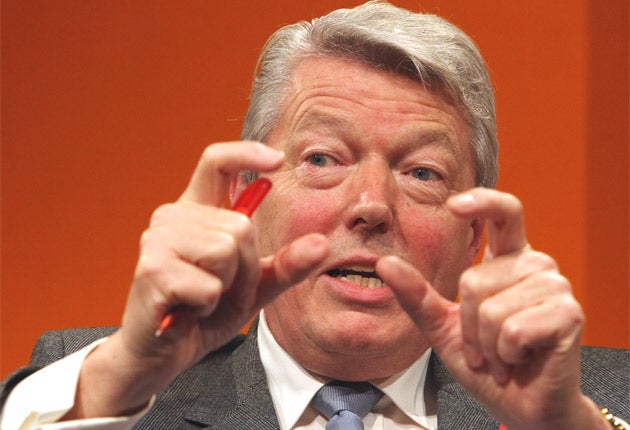Johnson building an army of private police
Home Secretary has presided over huge rise in number of civilian officers

Your support helps us to tell the story
From reproductive rights to climate change to Big Tech, The Independent is on the ground when the story is developing. Whether it's investigating the financials of Elon Musk's pro-Trump PAC or producing our latest documentary, 'The A Word', which shines a light on the American women fighting for reproductive rights, we know how important it is to parse out the facts from the messaging.
At such a critical moment in US history, we need reporters on the ground. Your donation allows us to keep sending journalists to speak to both sides of the story.
The Independent is trusted by Americans across the entire political spectrum. And unlike many other quality news outlets, we choose not to lock Americans out of our reporting and analysis with paywalls. We believe quality journalism should be available to everyone, paid for by those who can afford it.
Your support makes all the difference.Ministers are overseeing the growth of an army of private police officers, it is claimed today.
Figures released by the Home Office show that more than 1,600 council employees and other civilians, including dog wardens, park keepers and security guards, now have the power to police communities. In the last 12 months, under the tenure of home secretaries of Jacqui Smith and Alan Johnson, there has been a 20 per cent increase in the number of people who have been given the responsibilities. And the rapid growth in the army of civilians able to impose fines, confiscate property and demand names and addresses has been matched by an increasing use of private security companies to help police in their investigations.
Last night human rights groups attacked the "privatisation of policing" as a worrying erosion of civil liberties, and one senior police officer said he was unhappy about the role of private security companies in the policing of public demonstrations.
Peter Fahy, chief constable of Greater Manchester Police and the head of workforce development for the Association of Chief Police Officers (ACPO), said that he "did not believe there is a role for the private sector in the policing of public spaces". His comment follows reports that G4S, a private security company, has provided mobile custody cells and detention officers at two recent environmental demonstrations.
Shami Chakrabarti, the director of Liberty, said: "Sir Robert Peel would be spinning in his grave at the idea of replacing traditional, consent-based policing with Blackwater-style private security. The British public trusts police constables to keep the peace and uphold the rule of law. They don't expect such a sacred trust to be sub-contracted to the lowest bidder."
Sally Ireland, director of criminal justice policy at human rights group Justice, said: "This is clearly a worrying trend – coercive police powers should be confined to the police because they are properly trained and can be held accountable.
"People know that police officers, and to some degree community support officers, have these powers, but one need only consider the hostility directed to traffic wardens to appreciate the public's unwillingness to accept the use of intrusive powers by council employees. This could lead to dangerous situations of confrontation."
Under the Community Safety Accreditation Scheme (CSAS), the number of civilians wearing a special badge and a uniform approved by the local chief constable has risen by 267 to 1,667 in the last year. One reason for the growth was the decision by the Metropolitan Police to join the scheme introduced by Labour under the Police Reform Act 2002. The 30 "accredited" powers include the issuing of a fixed penalty notice for riding a bicycle on a footpath, for littering and to parents of truants.
An accredited civilian also has powers to deal with anti-social behaviour, which include requiring a person to stop drinking in a designated public place and confiscate and dispose of alcohol. They can also confiscate alcohol and tobacco from young people.
Yesterday the Government defended the policy. Policing minister David Hanson MP said: "The Community Safety Accreditation Scheme is a key part of the strong action we are taking to crack down on anti-social behaviour and low-level offences. This has the benefit of not only making our communities better places to live, but also of freeing up police time so officers can focus on the job they do best – tackling crime and protecting the public."
He added: "[Yesterday's] figures show that police forces are seeing the positive impact of a scheme that underlines our commitment to tackling the local crime and anti-social behaviour issues that matter the most."
Join our commenting forum
Join thought-provoking conversations, follow other Independent readers and see their replies
Comments